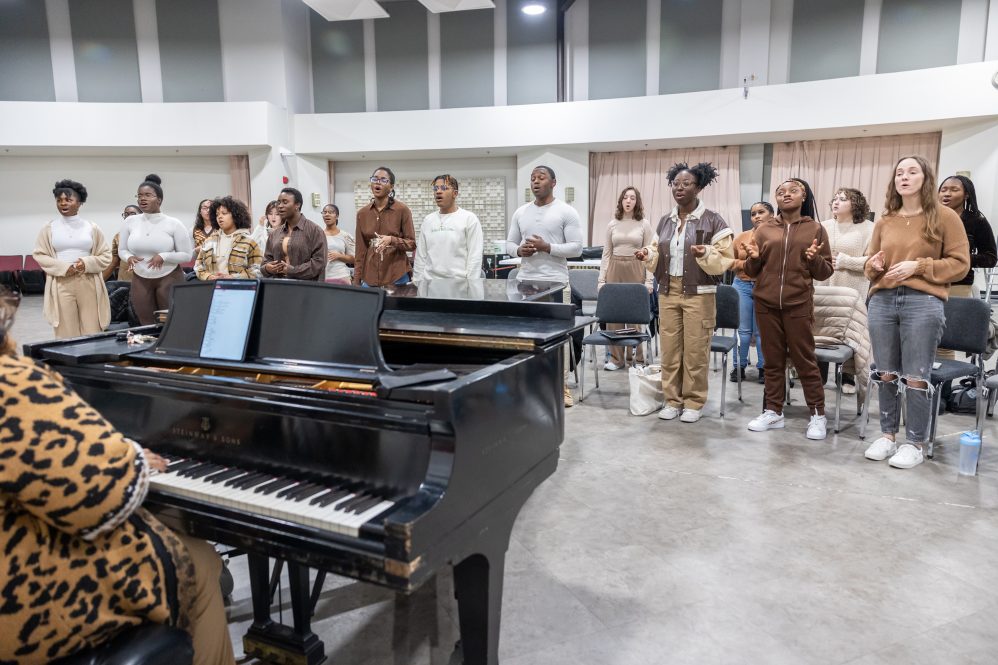There are many things Jacqueline Gordon ’26 (SFA) considered when applying to college last year, but what ultimately drew her to UConn wasn’t necessarily what most would expect – or what most would include on their must-have list.
“I’ve been involved with church since I was a baby, and I grew up singing in gospel choirs and choruses. I’ve always been drawn to this type of music because it’s so pretty and powerful,” she says. “In high school, when I was deciding between a couple of colleges, I was mostly looking at their gospel choirs. I picked UConn because of Voices of Freedom.”
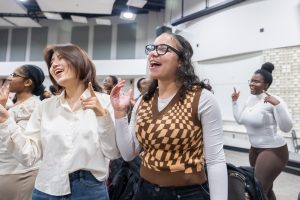
Danielle Livingston ’23 (BUS) says she found a home among the group that this semester totals about 35 members. After attending high school in Hartford and coming to a place where she’s among predominately white classmates who lead outwardly secular lives, Voices of Freedom gave her a place to find comfort.
It has been a “blessing,” she says, and is the one activity that has spanned her full college experience. There, on Wednesday evenings in Room 102 of the Music Building, she has found a community of people who could understand her background and find value in her beliefs.
“I’ve been into clubs that feel like work to go to every week,” she says. “This has never felt like that. It has never felt like something that’s taxing for me. We laugh, we practice, we sing, we joke with each other in that room. It just keeps me coming back.”
Born in the Civil Rights Movement
Even as hundreds of students have enjoyed time in Voices of Freedom over the last 50 years, bringing praise and song across the country while sharing the stage with some of the biggest gospel artists of the day, there’s been one stalwart in Lisa Clayton ’00 MM, who’s headed the group the last 28 years.
As mighty as her own singing voice may be, Clayton demurs in talking about her contributions, smiling at the thought of her longevity yet giving credit to founder Lorraine Rose Williams. It was in 1969 when Williams and other UConn students were on a bus ride that the idea for a University-sponsored gospel choir was formed.
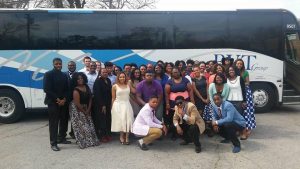
Originally called the Black Voices of Freedom Gospel Choir, the group’s original or early-era members included world-renowned preacher, the Rev. Claudette Copeland, and Grammy-nominated and Stellar Award-winning Kurt Carr, who, after leaving UConn, became the pianist for gospel giant James Cleveland, and later for Cleveland’s successor upon Cleveland’s death.
Williams led the choir for 16 years before giving the reigns to Bishop Marichal Monts and later Clayton, a vocal performance graduate student in 1995 who took the role to help pay for her own schooling.
Though decades have passed since Williams’ UConn departure, and even with her own death in 2010, Williams still is the heart of Voices of Freedom, a contribution that will earn her recognition later this year when the von der Mehden Recital Hall stage is named in her honor.
That’s a celebration for which Clayton is excited. Because, after all, gospel music is a celebration.
‘The songs take me to a place of adoration’
“All music has special elements, but what makes gospel music different is that it’s a message,” Clayton says.
Voices of Freedom follows the rule that gospel singers must feel the music, swaying to the beat and raising their hands to the heavens. That’s the performance practice of gospel, Clayton says, very different than classical choirs, whose members mostly stand straight with arms at their sides.
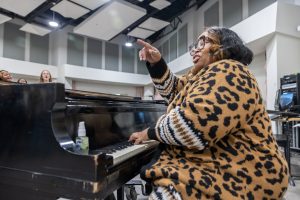
That means Livingston, Gordon, and the other members of Voices of Freedom can’t rely on just vocals.
“What would I like more of?” Clayton asks the group during a recent rehearsal.
“Energy,” one student shouts back.
“Altos, use your hands,” Clayton implores the vocal section as they sing the refrain – “Yes Lord, yes Lord, you turned it around” – from the song “Island Medley: Turned It Around/Hallelujah.”
Livingston, who is president of Voices of Freedom this academic year, says the message of gospel music is most inspiring to her because it talks about something larger than life and speaks to everyone, unlike a love song inherently dedicated for a singular person.
“When we’re singing gospel music, we’re singing from here to God,” she says. “When you understand the words that you’re singing, it becomes a lot bigger than just us here. For me, sometimes the songs take me to a place of adoration and help me to understand more of who God is. It pushes me to sing and to move, to lift my hands, to be happy as I sing, all of that comes from just that message, understanding that message.”
And that’s exactly what Clayton wants: “I expect you to feel joy and I expect you to share that joy. How do you share that joy? You’re going to use it. It’s going to be throughout your body and you’re going to use your hands, you’re going to clap, you’re going to stomp your feet, and you’re going to share your joy. That’s what makes gospel music so different.”
True, gospel choirs attract mostly Black musicians. But it’s untrue that only Black musicians can sing gospel.
Clayton says Voices of Freedom members, who at times have numbered up to 100 in a single semester, often aren’t music majors and are from varied ethnic backgrounds. Many exchange students have joined, in part because gospel music festivals have spread across the world and those from outside the U.S. are interested in learning more.
“When people enter my class, I’m sure they come with their preconceptions, but I help them to understand it’s a music for all people and it’s an expression of joy. So, I’ll push and I’ll prod until everybody is sharing in that sense of joy,” she says.
Offering Musical Opportunities
“I’ve seen a lot of different concerts with a lot of different music genres, and, to me at least, I feel like gospel is just so powerful because I’ve seen it move people in ways other genres might not be able to move people,” Gordon says. “I’ve seen it bring people closer to Jesus. I’ve seen it bring tears to people’s eyes. A lot of other music will do that as well, but I feel like this just touches my soul. It makes me warm inside.”
Clayton says she worked this month with the UConn Symphonic Wind Ensemble to help members prepare for their February concert that featured Black composers in honor of Black History Month. She offered them inspiration on how to feel the music.
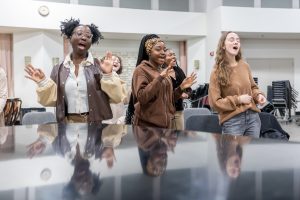
That same day, Livingston and her sister, Abigail Livingston ’20 (CLAS), who continues to join Voices of Freedom despite having graduated, sang the Black National Anthem “Lift Every Voice and Sing” before a women’s basketball game at Gampel Pavilion.
Then, later that night, the full group practiced during Wednesday rehearsal in preparation for joining the Hartford Chorale, Bloomfield High School, and the Choir School of Hartford during a Bushnell performance of “Every Pilgrim Has a Mountain” by African American composer David Hurd.
“I’m just so grateful to be able to provide so many different experiences for our students,” Clayton says, noting the group produced a CD in 2012 with all songs written by students, and in 2020 and 2021 Clayton released two YouTube recordings of the group, the first of which reached No. 1 on the gospel internet charts and the latter was shared worldwide by the Associated Press. “For a lot of them, they wouldn’t have these opportunities.”
During a recent Wednesday rehearsal, Clayton sits at the head of the grand piano in Room 102, directing the group facing her and seeming to have genuine fun as they work the sound of “ah” up and down the scale.
“Make sure you’re sitting up straight,” she yells as they move on to repeat the warmup mantra, “I love to sing, UConn VOF.”
They sing it again and again.
Eventually, she compliments them with genuine joy and enthusiasm, “The mouth was open, the jaw was dropped, an absolutely gorgeous sound.”
